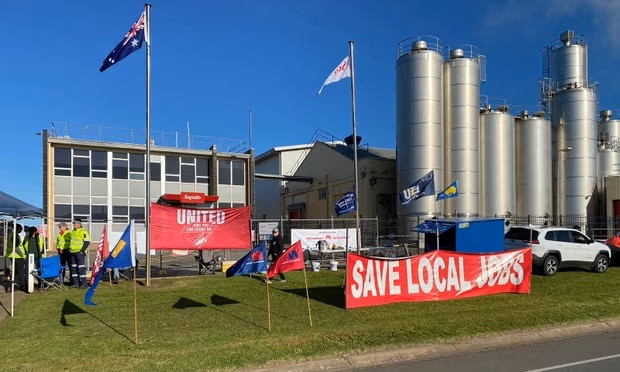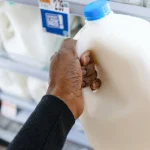
Processing workers who went on strike this week were fighting for the right for community consultation, as well as a 5% pay rise.
For the last 40 years, David Clements has worked as a machine operator at the Warrnambool Cheese and Butter factory at Allansford, 10km out of Warrnambool in western Victoria.
The business was taken over by Canadian dairy giant Saputo in 2017. A few years later, workers renegotiated their first enterprise bargaining agreement with the new owners, agreeing to a 2.5% annual pay increase for three years.
“It was during Covid so there was no opportunity to meet in person and there was no negotiation,” Clements said. “We just had to take the rollover.”
They are now pushing for a 5% increase and other rights including community service leave to volunteer during natural disasters. They have joined forces with dairy workers from other processing plants, who have demanded the same conditions.
Up to 1,400 workers at Victorian dairy processing facilities – owned by Saputo, New Zealand dairy cooperative Fonterra, Australian-owned dairy company Lactalis whose brands include Paul’s Milk and ice cream company Peter’s – went on a 48-hour strike this week, ending at 3am on Thursday.

Clements said the protests were about more than money, they’re about “future-proofing the dairy industry” and “keeping communities alive”. The rights sought by workers include a community consultation clause, in case of any major changes.
Up to 1,400 workers at Victorian dairy processing facilities – owned by Saputo, New Zealand dairy cooperative Fonterra, Australian-owned dairy company Lactalis whose brands include Paul’s Milk and ice cream company Peter’s – went on a 48-hour strike this week, ending at 3am on Thursday.

Clements said the protests were about more than money, they’re about “future-proofing the dairy industry” and “keeping communities alive”. The rights sought by workers include a community consultation clause, in case of any major changes.
“We are extremely worried about the dairy industry,” he said. “Saputo has threatened to close half their production facilities in Victoria. If any of these close down, it’s the communities that suffer.
“One hundred percent of our income goes back into the communities. In a lot of the regions, the dairy industry and processors are a major employer in the town and people will leave town if it’s not for the dairy industry.”
Earlier this year, Coles announced it had purchased two fresh milk processing plants from Saputo for $105m, a deal that remains subject to regulatory approval from the Australian Competition and Consumer Commission. If approved, Coles would become the first supermarket in Australia to own and operate its own milk processing facilities.
Saputo Dairy Australia’s director of operations, Gerard Lourey, said the company remains committed to continuing negotiations to reach an agreement with workers.
“Our intent is to resolve outstanding items with union representatives amicably and swiftly,” he said.
The United Workers Union national secretary, Tim Kennedy, said workers were disappointed in Saputo, Fonterra and the other multinational companies for failing to recognise the pressure their staff are under, due to the rising cost of living.
“If the wage outcomes are not met, then we will see workers forced to leave their regional communities in search of better paying jobs in the city,” Kennedy said.
“This has a death spiral effect as less money goes into regional communities and so the health of those regional communities declines even further.”
Industrial action at dairy processing sites has historically been rare, with disputes often resolved before workers decide to strike.

Dairy Farmers Victoria said it was concerned about the impact the strikes may have on the supply chain. Woolworths said it developed contingency plans to avoid running out of milk.
In a statement released this week, Dairy Farmers Victoria said while it respects the rights of the unions and processors to review pay and conditions, the industrial action would hurt the farmers, consumers and the environment.
“Our cows will continue to produce milk and our consumer family will continue to need milk, and we will be ready to supply that milk,” it said.
Lourey said Saputo dairy Australia worked with farmers and other industry players to ensure there was a home for all milk delivered during the industrial action.
Fonterra Australia supply chain and operations director Rob Howell said its farmers continued milking, and the company worked to ensure its perishable milk could be collected and not wasted.
A statement from Lactalis Australia issued during the strike said the company would work to avoid farmers dumping milk. However Dairy Farmers Australia said some milk had been dumped when it was not collected in time.
No pay deal or other agreement had been struck when the strike ended as scheduled on Thursday morning.
Clements said this was the first time he’d felt the need to strike.
“It’s never happened before. It is absolutely the last resort,” he said.
“It’s an extremely taxing work environment and with the cost of living and coming off the back of the pandemic, when the reward is a measly 3.3% a year [offered by the company in the current round of negotiations], you can understand why they’re upset.
“These people do not want to be out there. We would much prefer to be working, but the company has forced our hand at this one.”

























